2024-08-12 Mon
■ #5586. heldio が YouTube ポッドキャストとして古い配信回から順に再放送中です [voicy][heldio][youtube][heltube][helkatsu]
日頃より,本ブログの姉妹版・音声版である Voicy 「英語の語源が身につくラジオ (heldio)」をお聴きいただいています.この度,heldio の過去配信回を,私の YouTube チャンネル「heltube --- 英語史チャンネル」にてポッドキャストとして,再放送風に古いものから配信する取り組みを始めました.様子見として始めてみて3週間余が経ちますが,日々の準備のルーチンも徐々に固まってきており,少しずつ反響もいただくようになってきましたので,こちらの hellog でも公式にお知らせする次第です.
Voicy heldio では「英語史をお茶の間に」をモットーに,本ブログとともに英語史を広めるための音声コンテンツを日々配信してきています.本日までに3年2ヶ月ほど,通常配信としては1170回をお届けしてきました.リスナーの皆さんの支持のもと,少しずつ着実に聴いてくださる方々が増えてきています.ありがとうございます.
昨今ウェブ上のメディアは林立しており,ユーザーの皆さんの好むメディアもまちまちです.例えば,英語史コンテンツの発信をテキストで読むのが好きな方には,本ブログ hellog は近づきやすいと思いますが,Voicy heldio はお聴きでないかもしれません.逆に,音声配信を好む方は heldio では英語史の音声配信を受け取っていても,本ブログは普段は読んでいないかもしれません.さらに,動画がお好みという方は,潜在的に英語史に関心があったとしても,媒体違いの hellog や heldio には日常的にアクセスしないかもしれません.唯一絶対のメディアがない以上,伝えたいことのある発信者の目線としては,マルチ配信という形が有力なオプションとなります.
そしてこの度,先に述べたように heldio を YouTube 化してお届けすることにしました.YouTube 化といっても,正確には YouTube ポッドキャスト化というべきものにすぎず,YouTube 上にイラスト風の静止画像が映っている状態で,音声が流れるという形態です.heldio 最新回を YouTube でマルチ配信してもよいのですが,試行中ということもあり,ひとまず古い回から順に1日1回 YouTube ポッドキャスト化することにトライしています.YouTube で heldio 第1回からの「再放送」を聴取できるということになりますが,実際には heldio ですべての通常配信の過去回を選択して聴くことができますので,皆さんの聴取習慣に合わせて,ご都合のよい方をご利用いただければと思います.
YouTube で(も)聴取してくださるという方は,ぜひチャンネル登録をよろしくお願いいたします.また,おもしろいと思った配信回については,ぜひシェアもお願いします.
本日までに第23回までを公開していますが,目下もっとも人気のある配信回は,上に掲げた「heldio #17. 形容詞と副詞の no は別語源!」です(オリジナルの heldio 配信回はこちらです).このお盆休みに YouTube 経由でも heldio 配信回を聴取いただければ.
2024-08-11 Sun
■ #5585. 『子供の科学』9月号で小5生からの「なぜ,日本語と英語では語順が違うのですか?」に回答しました [notice][sobokunagimon][helkatsu][word_order][syntax][link][youtube][inohota][mond][voicy][heldio]

先日『子供の科学』9月号が発売されました.小学校3年生から中学生を読者層とする科学雑誌です.こちらの44頁にて,小学校5年生より寄せられてきた標題の素朴な疑問に回答しています.一言回答としては「古今東西,言語にはさまざまな語順があります」となります.
この質問については様々な媒体で取り上げてきましたが,今回は雑誌上で小学生に対して回答・解説するという初めての機会だったので,その点で頭を悩ませました.限られた紙幅で,何をどこまで伝えられるのか.易しく,かつ本質を突くような回答を探ってみましたが,はたして成功しているでしょうか.どのように読んでもらえているのか,気になるところです.
上記回答では英語が古くは現代の語順とは異なる語順をもっていた点にもちらと触れましたが,深掘りはできませんでした.この点に関心のある方は,ぜひ YouTube 「いのほた言語学チャンネル」より「英語の語順は大昔は SOV だったのになぜ SVO に変わったかいろいろ考えてみた.祝!!30回!」をご覧ください.
その他,本ブログでも語順 (word_order) 関連の話題はたびたび取り上げてきています.
[ 英語史における語順の変化・変異とその原因 ]
・ 「#3127. 印欧祖語から現代英語への基本語順の推移」 ([2017-11-18-1])
・ 「#132. 古英語から中英語への語順の発達過程」 ([2009-09-06-1])
・ 「#4597. 古英語の6つの異なる語順:SVO, SOV, OSV, OVS, VSO, VOS」 ([2021-11-27-1])
・ 「#4385. 英語が昔から SV の語順だったと思っていませんか?」 ([2021-04-29-1])
・ 「#2975. 屈折の衰退と語順の固定化の協力関係」 ([2017-06-19-1])
・ 「#4793. 多くの方に視聴していただいています!井上・堀田の YouTube 第30弾「英語の語順は大昔は SOV だったのになぜ SVO に変わったかいろいろ考えてみた」」 ([2022-06-11-1])
[ 基本語順の類型論 ]
・ 「#137. 世界の言語の基本語順」 ([2009-09-11-1])
・ 「#3124. 基本語順の類型論 (1)」 ([2017-11-15-1])
・ 「#3125. 基本語順の類型論 (2)」 ([2017-11-16-1])
・ 「#3128. 基本語順の類型論 (3)」 ([2017-11-19-1])
・ 「#3129. 基本語順の類型論 (4)」 ([2017-11-20-1])
・ 「#4316. 日本語型 SOV 言語は形態的格標示をもち,英語型 SVO 言語はもたない」 ([2021-02-19-1])
・ 「#3734. 島嶼ケルト語の VSO 語順の起源」 ([2019-07-18-1])
さらに,過去に書いてきた連載記事等も多々ありますので,リンクを張っておきます.
・ 英語史連載企画(研究社)「現代英語を英語史の視点から考える」の第11回と第12回
- 「#3131. 連載第11回「なぜ英語はSVOの語順なのか?(前編)」」 ([2017-11-22-1]) (連載記事への直接ジャンプはこちら)
- 「#3160. 連載第12回「なぜ英語はSVOの語順なのか?(後編)」」 ([2017-12-21-1]) (連載記事への直接ジャンプはこちら)
・ 知識共有サービス「Mond」での回答:「日本語ならSOV型,英語ならSVO型,アラビア語ならVSO型,など言語によって語順が異なりますが,これはどのような原因から生じる違いなのでしょうか?」
・ 「#3733.『英語教育』の連載第5回「なぜ英語は語順が厳格に決まっているのか」」 ([2019-07-17-1])
・ 「#4583. 『中高生の基礎英語 in English』の連載第9回「なぜ英語の語順は SVO なの?」」 ([2021-11-13-1])
・ 「#4527. 英語の語順の歴史が概観できる論考を紹介」 ([2021-09-18-1])
語順問題について改めて考えてみていただければ.
(以下,後記:2024/08/22(Thu))
・ 堀田 隆一 「なぜ,日本語と英語では語順が違うのですか? --- 古今東西,言語にはさまざまな語順があります」『子供の科学』2024年9月号,誠文堂新光社,2024年8月10日.44頁.
2024-08-10 Sat
■ #5584. なぜ英語ではいつも主語が必要なの? --- 中学生のための英語史 [sobokunagimon][voicy][heldio][notice][hel_education][hel_for_junior_high_school_students][subject][japanese][helkatsu]
標題は,あらゆる世代の英語学習者からよく尋ねられる素朴な疑問です.この疑問について,中学生を念頭において回答する heldio を2回に分けて収録しました.ぜひお聴きください.
・ 「#1166. なぜ英語ではいつも主語が必要なの? --- 中学生のための英語史」
・ 「#1167. 続・なぜ英語ではいつも主語が必要なの? --- 中学生のための英語史」
最初の配信回では,日本語では主語が省略できるのに英語では省略できないのはなぜか,という問題意識を念頭に,今回の質問に真正面から答えました.
一方,続編では見方を変えて,英語でも実は主語の省略はないわけではない,むしろ部分的には省略されている,と主張しました.ここから,英語と日本語は意外と似ている側面もあるのだな,と気づいてもらえれば幸いです.
今後,今回のような「中学生のための英語史」 (hel_for_junior_high_school_students) シリーズに力を入れていきたいと思っています.関連して,過去の hellog 記事「#5352. なぜ英語を学ばなければならないの? --- 中学生からの反響」 ([2023-12-22-1]) もご参照ください.
2024-08-04 Sun
■ #5578. 「推し前置詞」で盛り上がった helwa 配信回のスレッドを公開 [voicy][heldio][helwa][helkatsu][preposition][notice]
5月から6月にかけて,あなたの推しの前置詞は何ですか,という問いを方々に尋ねていました.とりとめのない話題ですが,Voicy heldio/helwa,本ブログ,大学の授業などで意外と盛り上がりました.関連するコンテンツへのリンクを時系列順に並べます.
・ helwa 「【英語史の輪 #135】あなたの「推しの前置詞」は何ですか?(無茶振り大会)」(2024年5月21日)
・ helwa 「【英語史の輪 #136】「推し前置詞」回の振り返り」(2024年5月22日)
・ heldio 「#1096. あなたの推し前置詞を教えてください with 小河舜さん&まさにゃん」(2024年5月31日)
・ heldio 「#1097. あなたの推し前置詞を教えてください with khelf 青木輝さん&藤原郁弥さん」(2024年6月1日)
・ hellog 「#5516. あなたの「推し前置詞」は何ですか?」 ([2024-06-03-1])
・ hellog 「#5517. 大学生に尋ねました --- あなたの「推し前置詞」は何ですか?」 ([2024-06-04-1])
・ hellog 「#5574. heldio/helwa でコメントが盛り上がった配信回,ベスト30」 ([2024-07-31-1])
特に最初に挙げた helwa 配信回「【英語史の輪 #135】あなたの「推しの前置詞」は何ですか?(無茶振り大会)」はおおいに盛り上がりました.コメント欄にスレッドが林立し,ほぼ前置詞のみの話題でお祭り騒ぎとなりました.一般には公開されていないスレッドですが,これを垣間見ると helwa の雰囲気やメンバー(「ヘルメイト」 "helmates" と呼んでいます)の気質(?)が分かるのではないかと思い,許可を得て,匿名化するなど多少の編集を加えた上でこちらに掲載することにしました(注:コメンテーターCは堀田です).新しいスレッドが上に掲載される仕様なので,下から読んでいくとよいと思います.
- A: despite🦕は気になる前置詞です🧐にもかかわらず、という語は日本語でも、「にも拘らず」という表記や「にも関わらず」という誤変換や「にもかかわらず」でひらかれていたり、さまざまあるので、文章内に見つけると、「あ、」と心の中で小さく反応してしまいます🧐
- E: あえてduringを挙げてみたいと思います。動詞由来のくせに早い段階で習う基礎語彙のポジションにおさまっていて、whileとの使い分けが文法問題の頻出事項にまでなっている、学習課程の中での存在感に他の動詞由来の前置詞よりふてぶてしさを感じます。
- B: 🙋?♂?私の高校時代、viaという前置詞やworth,given,providedの前置詞としての使用は習った記憶がありません。(英語は当時はかなり自信があったので間違いないと思います。)これは単に学習指導要領の変化の問題でしょうか?それとも昔はあまり使われ ていなかったこともあるのでしょうか?恥を忍んでお尋ねします。
- B: 手元の関正生「真・英文法大全」を開くと、前置詞の項には載っていない!ということは高校では習わない?
- F: 手元のものをいくつか見渡した上で高校生視点でいうと...1) via は普通出会わない上級語(大学入試には出ることあり)。 「海外への手紙の書き方」みたいなところで"VIA AIR MAIL"が表示されていることがあるかも。2) worth は worth -ing の「動名詞 」表現で出会うことが多く、注目される文法は -ing の態のほうでworth のはスルーされる。3) given, provided は上級レベルのテキストで「独立分詞構文」として。前置詞と言及されることはないかも。
- B: ありがとうございます🙇?♂?ちょ〜かつぜーんぶスッキリしました!つまずいた理由が分かるとやる気が出ます🚙💨お手数をおかけしました。
- G: イチオシ!というのは無いのですが、besideが気になりますね。上下方向ですと、up, above, over/down, below, underなど類義語がたくさんありますが、横の空間を表す前置詞はあまりないですよね?私たちは横方向に比べて縦方向を重視しているのでしょうか。
- H: à la仏語からの借用はよいが定冠詞まで取り込むのかよ、男性名詞にもつけるつもり!?
- H: à la king を見て卒倒cyning は男性名詞のはずなのに la をつけるとは🤔でも、これ料理用語ネタにも繋がる二度美味しい語かも🦆(source à la king)
- H: 前置詞+定冠詞が気になっていたら、またしても hellog に吸い込まれてしまいました。お釈迦様の掌から抜け出せない のはいつものことですが……。前置詞は名前プロジェクトネタにもなり得るということですかね。#5308. 地名では前置詞付き与格形が 残ることがあるhttps://user.keio.ac.jp/~rhotta/hellog/2023-11-08-1.html
- H: 仕事でよく使う前置詞としては regarding がありますが、面白みはあまりないかもしれませんね。一周回って of とかを推したくなります。古くからあって形も単純だが意味はいろいろ拡がっていて、属格の of 迂言形からは奪格の名残りも感じられる のではないかなどと妄想が膨らみますので。
- B: Hさんaboveとbelow の後置詞の使い方が分かりません。前置詞しか知りません。例文あったら教えてください。
- H: #136 を聴いて、非常に恥ずかしい間違いに気づきました😅😅😅料理の話題なら"sauce" à la kingですね。情報ソースを 提示するかどうか考えていたら混線した模様(言い訳満載)。
- H: B さんAs I said in the paragraph above,(先のパラグラフで述べたように)とかPlease see the table below.(下 表を見てください)とか、そんな感じでよく使っています。
- I: Hさん、私も後置派です(コソッ)
- B: 仏語のlaを英語はとりこんでいるんですか?知りませんでした。
- D: 言われてみればabove, belowは前置詞っぽくない場所にいるのを見かけますね。ジーニアスを見たらparagraph aboveのような使い方はは副詞または形容詞の後置修飾と説明されていました。paragraph aboveとabove the paragraphでは指すものが違うので、後者をaboveを後置して書き換えることはできない、という理解で合ってるのでしょうか😕
- H: D さんすみません、言われてみるとそうですね。前置詞の話と形容詞の前置 / 後置修飾の話とを混ぜて話してしま ったようです。私が違和感を覚えるのは前置詞としての above ではなく、形容詞としての above が前置修飾しているときだと思い至りました。above the paragraph ←これはよい(前置詞)the above paragraph ←違和感the paragraph above ←これもよい(ただし前置詞と対比される後置詞ではない)違和感の勇み足か😅
- H: B さん話を混ぜてしまったせいで後置詞があるかのように誤解を招いてしまい、すみませんでした。失礼いたしました🙇la の取り込みについては私も驚きでした。à la carte, à la mode のような塊で取り込まれることはあっても、à la が前置詞として切り出されて取り込まれているとは思っていませんでしたので。これも異分析の一種でしょうか🤔
- D: 確かにthe above paragraphはなんか気持ち悪いです。ジーニアスにはthe above(-mentioned) exampleという例がありまし て・・・the above exampleはヤだけどthe above-mentioned exampleならOKという気持ちになりました🤗
- H: 「ソース」ネタのリベンジと放出しそびれていた駄洒落供養とを一般配信回のコメントとして実施いたしました🙇(いろいろ余計なことを考えるからしくじるのだと自省を込めながら)#1096. あなたの推し前置詞を教えてください with 小河舜さん&まさにゃんhttps://voicy.jp/channel/1950/1293034
- C: 「駄洒落供養」はいいですね😂 今年の新語大賞決定!
- J: 文法的な観点ではないですが、響きが好きな前置詞は "beneath" です。俳句の翻訳でみかけますが、underneath とも合わせて、below, underではなく neathが使われていると、古風な詩的な香りが漂うところが魅力的。Netherlands の nether とも関連があるという地名語源話に関わる語彙。
- C: 現代での使用頻度を考えると re も「推し」候補ですね。cf. 「#647. メールの件名でみる RE: って何ですか?」 https://voicy.jp/channel/1950/486335
- K: 四則演算の記号は考えたことがなかったですが、確かに前置詞的ですね。そうであれば@も派生的な前置詞の一種と考えられるでしょうか。at signと名前は前置詞ばりで、at自体は前置詞ですが、あまりに記号すぎて認めていいか躊躇してしまいます。しかし 名誉前置詞会員に入れてもらえると、atの延長と考えても時間、場所、メールやSNSに時速や値段など、やたら広がったように感じま す。
- K: Atと違って文中で使う例が思いつかないので、やはり違う気がしてきました。
- K: こんなことを考えさせたatが好きです🤣
- I: via 旅好きなので✈?as 英文を書く時の助っ人
- L: Iさんviaいいですね。仕事で「クーリエで書類を送ります」のメールで「クーリエで」をvia courierと書いてくる人が いたので、それを見るとなぜか旅行気分になってました😃
- I: Lさん、via courierはお洒落ですね!courierはフランス語風味と思ったら、やはりそうでした。
- B: テキトーに発信したのがバズったのを受けて、念入りに作って発信したがサッパリ、というのを以前heldioで聴きましたが 私もしかり…この長い人生で、褒められようと頑張ったことが認められず、オフ会の生配信で面白半分にコメントしたことが👨?🏫から「すごいスキル」と褒めれ、驚くやら嬉しいやら。結局、自分が面白い、楽しい、と感じたことをやるのが一番、ということになりそうです。
- B: helwaもスタートしてそろそろ一年。今回の配信は「helwaのペース」を掴まれたような…。失敗を恐れず、愚痴も解き放ち、野心的にゲリラ的に展開し、そしてあくまで自然体。当初想像していた姿と重なるような…。少々早いですが一周年、お祝い申し上げ ます🎉🎂??
- I: そういえばもう1年ですね、早い〜。プレミアムの呼び方をどうしようか、Bさんとグレースさんはじめ皆さんで盛り上がっていましたよね😆
- B: Iさん懐かし〜😊Gさんと英語史サロンを推してたら👨?🏫が「略したらヘルサロになるやろうが?」と切れて?まし たね。最初は違和感しかなかった🤣「へるわ~~~」もなんやかんやで定着しつつと…コアリスナーにとってもこの1年は心に残る年にな りましたね?😊
- G: helwaももう1周年ですか、早いですね!名付けで盛り上がっていたこと、懐かしいです。メンバーが増えることはもちろんですが、当初からの皆さんがほぼ変わらずいらっしゃることは嬉しいですね?
- I: 「リスナーがへるわ〜」のコメントも記憶に新しく😅
- B: 「増えるわ〜〜」の反撃も記憶に新しい〜
- I: 堀田先生の勝ち〜
- B: 堀田先生の価値~~~
- G: ↑そこは、増すわ〜でお願いしますね🙏
- B: たしかに( * ?˘ ?* )型を忘れてた〜😭やり直し→価値増すわ〜 ↑校閲怖いわ〜😱
- D: 堀田先生の推し前置詞はthroughではないのですね😧子どもの頃に覚えた前置詞でダントツで変わり種だと思ったのはabove でした。宙に浮いてる状態なんて、宇宙に行った時くらいしか使わないのでは?と思っていました。私の推しはsaveですかね〜。なんかかっこいいし、意味さえ知っていれば使い方も難しくない気がします。
- D: given「〜を考慮に入れると」も好きかも。providedも兄弟みたいなものかと思っていたら、こちらは+that節で「〜という 条件で」という接続詞としての使い方しか無いのですね。なんとなく両者は同じようなものかと思っていましたが、今回のお題をきっかけに調べて品詞も意味も異なるのだと知りました。givenはthat節を続けて接続詞的にも使えるとなっていましたが。(ジーニアス で調べました)
- D: givenを推す理由は、とっても身近な動詞giveが前置詞になっているところに萌えるからでしょうか。givenとgiftedにはそ れぞれ全く違う意味が与えれていますね。
- B: Dさんスゴイ👏英検3級くらい持ってそー!ただの暇な人と思ってて失礼しました🙇?♂?
- B: あ、それとthroughはうまい👏Fさんしかり、みんな出さないだけで笑いのセンスありますね(^_^;)私の場合もはや絞らないと出てきません。でも生配信で即興でコメントできるスキルは有しているとの評判っす?🤣?
- H: D さんabove / below は個人的には後置に拘りがあります。最近では前置するひとも多いのですが、どうも落ち着かない感じがして、後置に直したくなってしまいます。他人の文に手を入れるのは我慢していますが、自分で書くときは必ず後置です。時代に抗っても虚しいのかもしれませんが。後置派いませんか〜📢
- B: Hさんコーチはいませんよ~~~📢
- B: 「堀田先生の推しはthroughではないのですね。」というD嬢のつぶやきの意味について考えてみました。これまでの先生の発言から515通りのthroughは先生👨?🏫の十八番、つまり「推し」と信じてた🙏それなのに…どうして?今回の誤配信はスルーではなかったの?からの〜「ここは当然スルーだろうが💣」と怒り大爆発💣。いやいや、ちょっと待て一度深呼吸して… 「先生の推しはthroughではないのですね」と静かにつぶやいた、とみましたがいかが?👨?🏫のコメントバックをスルーできずにコメントしました。
- D: 先生のブログに「今日のthrough」なるものまであるのに・・・。through「私に近づいてきたのはスペリング目当てだった のね😢」
- B: うまい!helwaは異能の宝石箱や~~~🙌
- B: 👨?🏫Dさんのスレッド、とりわけ「スペリング目当て」「😢」のくだりを是非コメントバックの回でご紹介ください🙇?♂?面白いスレッドありますよ📢でも構いませんので…😊無茶振りました🙇?♂?
- B: あっ、helwaでした🙇?♂?そちらで。
- F: worth。理由: 前置詞からはみ出る存在感
- F: とポジティブに書きましたが、「前置詞、または形容詞と言われています」などとつい言ってしまい、言わなきゃよかったと 後悔するやつです
- B: そのココロを是非おきかせください🙇?♂?多くのリスナーのために是非!えっ?👂いや、私は分かってるんですよ、あくまでみなさんのためにですよ…何言ってるんですか?( 'ω')エッ…みなさんお分かりですって?こりゃまた失礼いたしました🙇?♂?
- F: The beaches of Florida are well worth a visit.(ウィズダム英和辞典より)「いいいですかー、worth は 後ろに名詞がくる前置詞なので worth a visit のカタマリで『一度行ってみる価値がある』となります」だいたいこの辺で、しまったと後悔します 。「同時にこのカタマリは 主語 The beaches of Florida を説明する補語、つまり形容詞とも言えます」ここで虚無感に襲われます 。悪いことしてないのに辻褄合わせ答弁してるみたい😭
- D: 私もworth書こうと思ったら、Fさんに取られちゃいました〜。でもいまいち使いこなせないヤツなので推しではないかも。
- F: このスレッドは今から「推せない前置詞」となります
- B: 勉強になりました🙇?♂?worthに前置詞の機能があることは知りませんでした。私の辞書には載ってませんでした😭
- F: 【推せない前置詞】onto理由:どうしても一緒になりたかったのだろうけどお似合い感がない。intoはお似合い。uponは微妙 。悪口ですいません。でも無限にやれそう。
- B: Fさんの切り口発見力は尋常ではない!それは、英語語源辞典の「駆逐」から始まっていたのだ(?ー?ωー?)キリッ
- C: Fさん、D さん、皆さん、worth の品詞をめぐる問題については hellog よりこちらを参照ください🔗 http://user.keio.ac.jp/~rhotta/cgi-bin/clsearch.cgi?key=4837,4838
- I: onto、面白すぎます笑推せない前置詞シリーズもいいですね。notwithstandingは推せません。最初見たとき何事かと思いました。
- B: Iさんnotwithstanding な、な、なんですか?これ?一つ一つは簡単な語…「にも関わらず」リアルタイムで驚いています😱現場からは以上です!
- I: Bさん、もしかしてと思ったらやはりhellogにありました〜。#5064 Notwithstandinghttps://user.keio.ac.jp/~rhotta/hellog/2023-03-09-1.html大人になってから知った語ですが、意外に見かけるんですよね。
- B: Iさんhellog読みました。これで忘れません( ˙?˙ )?こうやってみんなで教えあって学ぶのってステキ😍?私は教えて もらうばかりてすが…その分笑わせられるよう頑張ります(? ??_??)?
- I: 私も成り立ちが分かり勉強になりました。推せない前置詞からも昇格🚀
- F: を。理由: 助詞あってこその文字だから
- C: さすが、Fさん、切れ味が鋭いですっ(≧∇≦)b
- B: 最初、( ˙?˙ )チョトナニイッテルカワカンナイ でしたが、時間差でスゲ〜👏コウサンデス( ? )_🏳
- I: Fさん名言集作りたいです
- F: こんなに暖かく受け入れていただくのはここだけです😢
- B: ここはちょっと異能な人間の吹き溜まり、もとい駆け込み寺?お互いを褒め合い、傷を舐め合いましょう??
2024-08-03 Sat
■ #5577. まさかの「hellogる」! [conversion][japanese][voicy][heldio][kikuchi_shota][hybrid][furansu_rensai]

白水社の月刊誌『ふらんす』で連載記事「英語史で眺めるフランス語」を書いています.最新号では「中英語期のフランス借用語が英語語彙に与えた衝撃」と題して記事を書きましたが,その最後で混成語 (hybrid) を取り上げました.oddity, murderous などのように英語本来語の基体にフランス借用語の接尾辞がついているような「ちゃんぽん語」のことです.日本語では洋・漢・和の「デパ地下めぐり」などがあります.
おもしろい話題なので Voicy heldio でも取り上げ,リスナーの皆さんに,主に日本語からの例を挙げてくれるように呼びかけました.たちどころに多くの例が集まりました.木・金曜日の配信回をお聴きください.
・ 「#1159. ハイブリッド語のおもしろい例をください --- 『ふらんす』8月号で英仏ハイブリッド語に触れています」
・ 「#1160. 早速リスナーさんから寄せられたハイブリッド語をご紹介」
この遊び企画にすかさず反応されたのが,菊地翔太さん(専修大学)です.ご自身の note にて「ハイブリッド語の例(語形成・語源の観点から)」と題する記事を公開されました.たくさんのハイブリッド語が挙げられており,形態論的に分析されています.この話題について理解を深めるのに必読です.
記事を拝読して驚いたのは,菊地ゼミの一部で,本ブログの名前にちなむ「hellogる」なる動詞が造語・使用されているとのこと.意味は「hellogで調べる」ということのようですが,これにはたまげました.この語がまさにハイブリッド語としてまともに分析されており,二度びっくり.
そちらの note 記事で「hellogる」の形態ツリーを描いていただきましたが,私としても詳細に分析しなければということで,以下に堀田版を示したいと思います.

「hellogる」についで「heldioる」も出てくることを期待しています(「heldioで調べる」「heldioを聴く」「heldioを収録する」「heldioで暴れる」など多義).
2024-07-31 Wed
■ #5574. heldio/helwa でコメントが盛り上がった配信回,ベスト30 [voicy][heldio][helwa][ranking][helkatsu][notice]
7月29日現在,Voicy 「英語の語源が身につくラジオ (heldio)」にて3年2ヶ月ほどをかけて通常配信,プレミアム限定配信,有料配信を合わせて1,372回ほどの配信回をお届けしてきました.とりわけこの1年半ほどは,リスナーの皆さんのご協力によりコメント欄が賑わいをみせ,英語史コミュニティとして徐々に盛り上がってきた感があります.ありがとうございます.
Voicy のアナリティクスにより,寄せられたコメントが多い配信回のベスト30を拾い出してみました.対談や企画ものの配信回で,リスナーの皆さんが呼びかけに応じて多くコメントくださる場合に,議論が盛り上がり,ますますコメント欄が賑わうといった傾向が見られるようです.
コメント欄自体が1つのコンテンツになっているのではないかと思われるほど面白い回もありますので,改めて読んだり聴いたりしていただければと思います.第1位に輝いたニックネーム考の回などは,振り返ってみると一大イベントになっています!
引き続き,皆さんのコメント欄での盛り上げに期待しています!
2024-07-27 Sat
■ #5570. 古英語の動詞 dugan と agan の活用 [oe][preterite-present_verb][inflection][beowulf][voicy][heldio][etymology][hajimeteno_koeigo]
「#5542. 「ゼロから学ぶはじめての古英語」 Part 9 with 小河舜さん,まさにゃん,村岡宗一郎さん」 ([2024-06-29-1]) では,Voicy heldio の人気シリーズの最新回となる「#1124. 「はじめての古英語」第9弾 with 小河舜さん&まさにゃん&村岡宗一郎さん」を紹介しました.その配信回では,小河さんによって取り上げられた Beowulf からの1文が話題となりました.
Wyrd oft nereð/ unfǣgne eorl, þonne his ellen dēah. (ll. 572b--73)
"Fate often saves an undoomed earl, when his courage avails."
「運命はしばしば死すべき運命にない勇士を救う,彼の勇気が役立つ時に」
引用の最後の語 dēah は, "to be good, to be strong, to avail" 意味する dugan という動詞の3単現の形です.妙な形態ですが,それもそのはず,歴史的には過去現在動詞 (preterite-present_verb) と呼ばれる特殊な型の動詞でした(cf. 「#66. 過去現在動詞」 ([2009-07-03-1])).
Sweet's Anglo-Saxon Primer (37) より,この動詞の活用表を,もう1つのよく似た仲間の動詞 āgan "to own, possess" と並べて掲げましょう.
| Infin. | dugan 'avail' | āgan 'own' | ||
| Pres. | sing. | 1, 3. | dēah | āh |
| Pres. | sing. | 2. | āhst | |
| Pres. | pl. | dugon | āgon | |
| Pres. | subj. | dyge, duge | āge | |
| Pret. | dohte | āhte | ||
| Past | part. | āgen (only as adj.) |
いずれの動詞も,その後は複雑な歴史をたどりました.dugan については,doughty (勇敢な,有能な),dow ([北部・スコットランド方言]成功する,うまくやる)が関連語として現代に伝わっています.
・ Davis, Norman. Sweet's Anglo-Saxon Primer. 9th ed. Oxford: Clarendon, 1953.
[ 固定リンク | 印刷用ページ ]
2024-07-25 Thu
■ #5568. 9月8日(日)「英語史ライヴ2024」を開催します [hellive2024][khelf][voicy][heldio][helwa][helkatsu][hel_education][notice]

Voicy 「英語の語源が身につくラジオ (heldio)」のイベントのご案内です.2024年9月8日(日)に12時間連続の公開生収録の「英語史ライヴ2024」 (hellive2024) を都内某所で開催します! khelf(慶應英語史フォーラム)主催の,英語史に特化した大企画です.英語史系イベントとしては前代未聞の試みとなります.
学界の一線で活躍する研究者の先生方との対談を企画しているほか,「英語史クイズ」や人気シリーズ「はじめての古英語」なども予定しています.また,多くの出版社より協賛いただくことになっております.
当日は午前6時から午後6時まで,12時間の Voicy heldio 生配信をお届けします.公開生収録には,khelf メンバー,他大学の関係者の先生方や学生たちが立ち会います.
そのほか,Voicy heldio のプレミアムリスナー限定配信チャンネル「英語史の輪」 (helwa)(月額800円のサブスク)のリスナーさんにもご登録の上ご参加いただけます.詳しくは7月18日(木)の配信回「【英語史の輪 #160】「英語史ライヴ2024」への参加を正式に募集します(生配信)」をお聴きください.「英語史ライヴ2024」に参加するために helwa にお入りいただくことも歓迎いたします.
今から1ヶ月半ほど後のイベントですが,目下 khelf で鋭意準備中です.7月25日現在,「英語史ライヴ2024」に関して決まっていることを一覧します.
【メイン MCs】
・ 青木輝さん(khelf 会長,慶應義塾大学大学院生)
・ 藤原郁弥さん(慶應義塾大学大学院生)
・ 「まさにゃん」こと森田真登さん(武蔵野学院大学,元 khelf 会長)
・ 小河舜さん(上智大学)
・ 金田拓さん(帝京科学大学)
・ 堀田隆一(慶應義塾大学)
【対談予定の先生(五十音順)】
・ 秋元実治先生(青山学院大学名誉教授)
・ 家入葉子先生(京都大学)
・ 井上逸兵先生(慶應義塾大学)
・ 今村洋美先生(中部大学)
・ 田辺春美先生(成蹊大学)
・ 福元広二先生(法政大学)
・ 保坂道雄先生(日本大学)
・ 和田忍先生(駿河台大学)
【協賛出版社(五十音順)】
・ 朝倉書店
・ 開拓社
・ 研究社
・ 昭和堂
・ 大修館書店
・ 中央大学出版部
・ 白水社
・ 早川書房
・ ひつじ書房
【配信予定の番組】
・ 先生方との対談
・ 人気シリーズ「はじめての古英語」
・ 英語史クイズ
・ 『英語史新聞』第10号お披露目
・ 『英語語源辞典』読書会
・ 古英語LINEスタンプお披露目
今後の決定事項は随時 heldio の配信回や,khelf の公式 HP より「英語史ライヴ2024」特設ページにてお知らせしていきます.また,khelf の公式 X アカウント @khelf_keio,および khelf の公式 Instagram アカウント @khelf_keio からもイベント情報を発信していきます.日々ご注目ください.
とりわけ heldio では,頻繁に「英語史ライヴ2024」関連の告知配信をお届けしていく予定です.これまでの重要な告知回を挙げておきます.
・ 「#1119. 9月8日(日)「英語史ライヴ2024」を開催します by khelf」(2024年6月22日)
・ 「#1145. 重大告知 --- khelf 主催「英語史ライヴ2024」の出演者と協賛社の発表」(2024年7月18日)
・ 「#1152. 【速報】「英語史ライヴ2024」スポンサー,研究社との打合報告」(2024年7月25日)
「英語史ライヴ2024」,準備段階からおおいに盛り上げていきたいと思います.応援をよろしくお願いいたします.
2024-07-19 Fri
■ #5562. YouTube 「いのほたチャンネル」で250回記念としてライヴ配信を行ないました [youtube][inohota][notice][helkatsu][inoueippei][voicy][heldio]
一昨日7月17日(水)の19:00より,同僚の井上逸兵さんと運営している YouTube 「いのほた言語学チャンネル」にて,250回記念のライヴ配信をお届けしました.100名を超える方々にライヴでご視聴いただきました.ありがとうございます.アーカイヴ配信としても視聴できますので,ぜひ「#250. 250回記念ライヴ」からどうぞ(80分ほどの配信です).
今回のライヴ配信は,半年前の200回記念「#5388. YouTube 「いのほたチャンネル」で200回記念として初めてのライヴ配信を行ないました」 ([2024-01-27-1]) に続く第2弾でした.今後も時折このようなライヴ配信をお届けしたいと思っています.
今回は雑談回ではありましたが,後半にかけて重要な呼びかけやお知らせがありました.
(1) この YouTube チャンネルの飲み会回「言語学バル」に,ゲスト出演していただける英語史界隈の方,ぜひお声がけください!
(2) 9月8日(日)に Voicy 「英語の語源が身につくラジオ (heldio)」として12時間生配信の「英語史ライヴ2024」を開催します.そのフィナーレには,井上逸兵さんも登場する予定です.こちらのイベントの最新情報は「#1145. 重大告知 --- khelf 主催「英語史ライヴ2024」の出演者と協賛社の発表」よりお聴きください!
引き続き「いのほた言語学チャンネル」をよろしくお願いいたします.
2024-07-17 Wed
■ #5560. 7月27日(土)の朝カル新シリーズ講座第4回「現代の英語に残る古英語の痕跡」のご案内 [asacul][notice][kdee][etymology][hel_education][helkatsu][link][lexicology][vocabulary][oe][voicy][heldio]
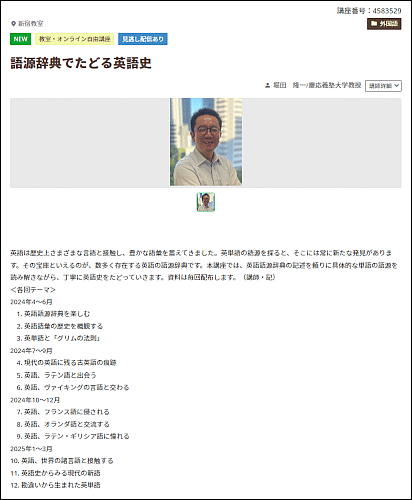
今年度,朝日カルチャーセンター新宿教室にてシリーズ講座「語源辞典でたどる英語史」を月に一度のペースで開講しています.4,5,6月と3回の春期クールを終え,この7月からは夏期クールが始まります.
第4回は来週末の7月27日(土)の夕方 17:30--19:00 に開講されます.お申し込み窓口が開いておりますので,ぜひこちらより詳細をご確認ください.講座形式はいわゆるハイブリッド形式で,新宿教室での対面受講,あるいはリアルタイム・オンラインでの受講が可能です.また申込みされた方は,「見逃し配信」として,その後1週間,講座を視聴できます.ご都合の良い方法でご参加ください.以下の通り,本シリーズは全12回を予定していますが,各回,各クールの独立性は高いので,夏期クールより初めての受講であっても,まったく問題ありません.
1. 英語語源辞典を楽しむ(2024年4月27日)
2. 英語語彙の歴史を概観する(2024年5月18日)
3. 英単語と「グリムの法則」(2024年6月8日)
4. 現代の英語に残る古英語の痕跡(2024年7月27日)
5. 英語,ラテン語と出会う(2024年8月24日)
6. 英語,ヴァイキングの言語と交わる(2024年9月28日)
7. 英語,フランス語に侵される(日付未定)
8. 英語,オランダ語と交流する(日付未定)
9. 英語,ラテン・ギリシア語に憧れる(日付未定)
10. 英語,世界の諸言語と接触する(日付未定)
11. 英語史からみる現代の新語(日付未定)
12. 勘違いから生まれた英単語(日付未定)
7月以降の夏期クールも毎月1回,指定の土曜日の夕方 17:30--19:00 に開講する予定です.春期クールから続いているシリーズではありますが,各クール,各回とも独立性の高い講座ですので,夏期クールより初めてのご参加であっても,まったく問題ありません.
春期クール3回の広い意味での「イントロ」を終え,夏期クールはいよいよ英語語彙史の具体的な記述が始まります.第4回は「現代の英語に残る古英語の痕跡」と題して,英語史の幕開きとなる古英語 (Old English) の時代に注目します.古英語とは紀元449--1100頃の英語を指しますが,語彙においても,そして発音,文字,文法においても,現代英語とは驚くほど異なる言語でした.現代の観点からみると,例えば古英語の語彙は,その多くの割合が現代まで生き延びずに,死語となっています.古英語と現代英語の語彙は,内容も規模も大きく異なるのです.
確かに語彙の断続性は著しいのですが,語彙の継続性にも注目したいところです.第4回講座の目標は,古英語と現代英語の語彙が間違いなくつながっているという事実を確認することです.
第4回のお知らせと概要は,先日 Voicy heldio でもお話ししました.「#1140. 7月27日(土),朝カルのシリーズ講座第4回「現代の英語に残る古英語の痕跡」が開講されます」をお聴きください.
シリーズでは『英語語源辞典』(研究社)を頻繁に参照します.同辞典をお持ちの方は,講座に持参されると,より楽しく受講できるかと思います(もちろん手元になくとも問題ありません).
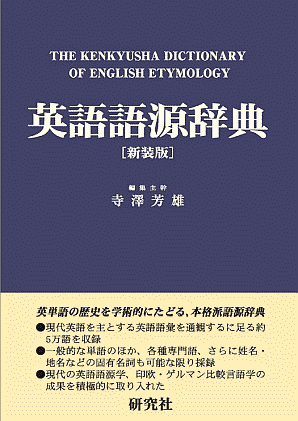
本シリーズに関する hellog の過去記事へリンクを張っておきますので,ご参照ください.
・ 「#5453. 朝カル講座の新シリーズ「語源辞典でたどる英語史」が4月27日より始まります」 ([2024-04-01-1])
・ 「#5481. 朝カル講座の新シリーズ「語源辞典でたどる英語史」の第1回が終了しました」 ([2024-04-29-1])
・ 「#5486. 5月18日(土)の朝カル新シリーズ講座第2回「英語語彙の歴史を概観する」のご案内」 ([2024-05-04-1])
・ 「#5511. 6月8日(土)の朝カル新シリーズ講座第3回「英単語と「グリムの法則」」のご案内」 ([2024-05-29-1])
・ 「#5528. 朝カル講座の新シリーズ「語源辞典でたどる英語史」の春期3回が終了しました」 ([2024-06-15-1])
春期クールは,私の歴代朝カル講座のなかで最も多くの方々に受講していただきました.第4回から始まる夏期クールも,多くの方々のご参加をお待ちしております!
・ 寺澤 芳雄(編集主幹) 『英語語源辞典』 研究社,1997年.
2024-07-14 Sun
■ #5557. 秋元実治(著)『増補 文法化とイディオム化』(ひつじ書房,2014年) [toc][grammaticalisation][idiomatisation][idiom][composite_predicate][syntax][lexicology][frequency][lexicalisation][preposition][phrasal_verb][voicy][heldio]
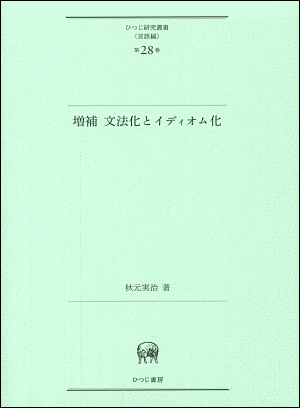
先日,秋元実治先生(青山学院大学名誉教授)と標記の書籍を参照しつつ対談しました.そして,その様子を一昨日 Voicy heldio で「#1139. イディオムとイディオム化 --- 秋元実治先生との対談 with 小河舜さん」として配信しました.中身の濃い,本編で22分ほどの対談回なっております.ぜひお時間のあるときにお聴きください.
秋元実治(著)『増補 文法化とイディオム化』(ひつじ書房,2014年)については,これまでもいくつかの記事で取り上げてきており,とりわけ「#1975. 文法化研究の発展と拡大 (2)」 ([2014-09-23-1]) で第1章の目次を挙げましたが,今回は今後の参照のためにも本書全体の目次を掲げておきます.近日中に対談の続編を配信する予定です.
改訂版はしがき
はしがき
理論編
第1章 文法化
1.1 序
1.2 文法化とそのメカニズム
1.2.1 語用論的推論 (Pragmatic inferencing)
1.2.2 漂白化 (Bleaching)
1.3 一方向性 (Unidirectionality)
1.3.1 一般化 (Generalization)
1.3.2 脱範疇化 (Decategorialization)
1.3.3 重層化 (Layering)
1.3.4 保持化 (Persistence)
1.3.5 分岐化 (Divergence)
1.3.6 特殊化 (Specialization)
1.3.7 再新化 (Renewal)
1.4 主観化 (Subjectification)
1.5 再分析 (Reanalysis)
1.6 クラインと文法化連鎖 (Grammaticalization chains)
1.7 文法化とアイコン性 (Iconicity)
1.8 文法化と外適応 (Exaptation)
1.9 文法化と「見えざる手」 (Invisible hand) 理論
1.10 文法化と「偏流」 (Drift) 論
第2章 イディオム化
2.1 序
2.2 イディオムとは
2.3 イディオム化
2.4 イディオム化の要因
2.4.1 具体的から抽象的
2.4.2 脱範疇化 (Decategorialization)
2.4.3 再分析 (Reanalysis)
2.4.4 頻度性 (Frequency of occurrence)
2.5 イディオム化,文法化及び語彙化
分析例
第1章 初期近代英語における複合動詞の発達
1.1 序
1.2 先行研究
1.3 データ
1.4 複合動詞のイディオム的特徴
1.4.1 Give
1.4.2 Take
1.5 ジャンル間の比較: The Cely Letters と The Paston Letters
1.6 結論
第2章 後期近代英語における複合動詞
2.1 序
2.2 先行研究
2.3 データ
2.4 構造の特徴
2.5 関係代名詞化
2.6 各動詞の特徴
2.6.1 Do
2.6.2 Give
2.6.3 Have
2.6.4 Make
2.6.5 Take
2.7 複合動詞と文法化
2.8 結論
第3章 Give イディオムの形成
3.1 序
3.2 先行研究
3.3 データ及び give パタンの記述
3.4 本論
3.4.1 文法化とイディオム形成
3.4.2 再分析と意味の漂白化
3.4.3 イディオム化
3.4.4 名詞性
3.4.5 構文と頻度性
3.4 本論
3.4.1 文法化とイディオム形成
3.4.2 再分析と意味の漂白化
3.4.3 イディオム化
3.4.4 名詞性
3.4.5 構文と頻度性
3.5 結論
第4章 2つのタイプの受動構文
4.1 序
4.2 先行研究
4.3 データ
4.4 イディオム化
4.5 結論
第5章 再帰動詞と関連構文
5.1 序
5.2 先行研究
5.3 データ
5.3.1 Content oneself with
5.3.2 Avail oneself of
5.3.3 Devote oneself to
5.3.4 Apply oneself to
5.3.5 Attach oneself to
5.3.6 Address oneself to
5.3.7 Confine oneself to
5.3.8 Concern oneself with/about/in
5.3.9 Take (it) upon oneself to V
5.4 再帰動詞と文法化及びイディオム化
5.5 再起動し,受動化及び複合動詞
5.5.1 Prepare
5.5.2 Interest
5.6 結論
第6章 Far from の文法化,イディオム化
6.1 序
6.2 先行研究
6.3 データ
6.4 文法化とイディオム化
6.4.1 文法化
6.4.2 意味変化と統語変化の関係:イディオム化
6.5 結論
第7章 複合前置詞
7.1 序
7.2 先行研究
7.3 データ
7.4 複合前置詞の発達
7.4.1 Instead of
7.4.2 On account of
7.5 競合関係 (Rivalry)
7.5.1 In comparison of/in comparison with/in comparison to
7.5.2 By virtue of/in virtue of
7.5.3 In spite of/in despite of
7.6 談話機能の発達
7.7 文法化,語彙化,イディオム化
7.8 結論
第8章 動詞派生前置詞
8.1 序
8.2 先行研究
8.3 データ及び分析
8.3.1 Concerning
8.3.2 Considering
8.3.3 Regarding
8.3.4 Relating to
8.3.5 Touching
8.4 動詞派生前置詞と文法化
8.5 結論
第9章 動詞 pray の文法化
9.1 序
9.2 先行研究
9.3 データ
9.4 15世紀
9.5 16世紀
9.6 17世紀
9.7 18世紀
9.8 19世紀
9.9 文法化
9.9.1 挿入詞と文法化
9.9.2 丁寧標識と文法化
9.10 結論
第10章 'I'm afraid' の挿入詞的発達
10.1 序
10.2 先行研究
10.3 データ及びその文法
10.4 文法化---Hopper (1991) を中心に
10.5 結論
第11章 'I dare say' の挿入詞的発達
11.1 序
11.2 先行研究
11.3 データの分析
11.4 文法化と文体
11.5 結論
第12章 句動詞における after と forth の衰退
12.1 序
12.2 For による after の交替
12.2.1 先行研究
12.2.2 動詞句の選択と頻度
12.2.3 After と for の意味・機能の変化
12.3 Forth の衰退
12.3.1 先行研究
12.3.2 Forth と共起する動詞の種類
12.3.3 Out による forth の交替
12.4 結論
第13章 Wanting タイプの動詞間に見られる競合 --- desire, hope, want 及び wish を中心に ---
13.1 序
13.2 先行研究
13.3 昨日変化
13.3.1 Desire
13.3.2 Hope
13.3.3 Want
13.3.4 Wish
13.4 4つの動詞の統語的・意味的特徴
13.4.1 従属節内における法及び時制
13.4.1.1 Desire + that/Ø
13.4.1.2 Hope + that/Ø
13.4.1.3 Wish + that/Ø
13.4.2 Desire, hope, want 及び wish と to 不定詞構造
13.4.3 That の省略
13.5 新しいシステムに至る変化及び再配置
13.6 結論
結論
補章
参考文献
索引
人名索引
事項索引
・ 秋元 実治 『増補 文法化とイディオム化』 ひつじ書房,2014年.
2024-07-11 Thu
■ #5554. リスナー投票による heldio 2024年第2四半期のランキング [voicy][heldio][notice][ranking][link][helkatsu]

「#5546. heldio 2024年第2四半期のベスト回を決めるリスナー投票 --- 7月9日までオープン」 ([2024-07-03-1]) でご案内したとおり,「hel活」 (helkatsu) の一環として,今年第2四半期における Voicy heldio のベスト配信回を決めるリスナー投票(1人10票まで)を実施しました.29名よりご投票いただきました.ご協力ありがとうございました.
投票結果をまとめましたので,本記事にて報告いたします.上位10位までの計14回分を掲載しています.詳しくは Slido での投票結果をご覧ください.
1. 「#1124. 「はじめての古英語」第9弾 with 小河舜さん&まさにゃん&村岡宗一郎さん」 (48%)
2. 「#1066. ノルマン征服 --- Ten Sixty-Six」 (34%)
3. 「#1064. eavesdrop 「盗み聞きする」」 (31%)
3. 「#1115. 言語にはムダが多すぎる --- 言語の余剰性」 (31%)
5. 「#1039. 英語発音は日本語よりも「口の可動域」が広い! 矢冨弘先生のブログ記事より」 (28%)
5. 「#1096. あなたの推し前置詞を教えてください with 小河舜さん&まさにゃん」 (28%)
5. 「#1125. 「はじめての古英語」第9弾のアフタートーク」 (28%)
8. 「#1043. ある用途のために発達してきたものを別の用途のために用いる「外適応」」 (24%)
8. 「#1126. 世にも奇妙な「過去現在動詞」」 (24%)
10. 「#1057. 「はじめての古英語」生放送 with 小河舜さん&まさにゃん --- Bede を読む (2)」 (21%)
10. 「#1085. hamburger の形態論」 (21%)
10. 「#1088. 企業の対外的なメッセージについて語る --- 北澤茉奈さんとの対談 (1)」 (21%)
10. 「#1104. 著者と語る『World Englishes 入門』(昭和堂,2023年) --- 山本忠行先生とのアフリカの英語をめぐる対談 (2)」 (21%)
10. 「#1109. 『法と言語』第9章 --- 五所万実さんの「商標言語学」」 (21%)
第1位には,「はじめての古英語」シリーズより「#1124. 「はじめての古英語」第9弾 with 小河舜さん&まさにゃん&村岡宗一郎さん」が選ばれました! 過去2回のリスナー投票に引き続き3連覇です.本シリーズを人気シリーズに押し上げてくださったリスナーの方々に感謝致します.普段は小河舜先生(上智大学)および「まさにゃん」こと森田真登先生(武蔵野学院大学)とのトリオでお送りしている古英語入門シリーズですが,今回は村岡宗一郎先生(日本大学)にもご同席いただき,いつもよりさらに賑やかな回となりました.小河さんによる Beowulf からの渾身の選文も効いていたと思います.なお,そのアフタートークも第5位に付けているので,合わせて多くのリスナーの方々に楽しんで聴いていただいたものと受け取っております.
第2位の「#1066. ノルマン征服 --- Ten Sixty-Six」も嬉しい入賞です.配信回番号を歴史年号に見立てた初めての回でしたが,これ自体は実はリスナーさんのアイディアでした.おかげさまです.
第3位には,「英語の語源が身につくラジオ」としては正当なトピックである「#1064. eavesdrop 「盗み聞きする」」と,言語の本質に迫った「#1115. 言語にはムダが多すぎる --- 言語の余剰性」が得票率タイで入賞しています.後者はコメント欄も非常に盛り上がりました(ぜひ覗いてみてください).
第5位タイの3回のうち2回は「はじめての古英語」シリーズのメンバーによる雑談回です.もう1回は矢冨弘先生(熊本学園大学)のコンテンツにあやかった「#1039. 英語発音は日本語よりも「口の可動域」が広い! 矢冨弘先生のブログ記事より」でした.
第8位以下の詳細は省略しますが,今年の heldio の大テーマである言語変化 (language_change) に関連する回や,ゲスト対談回も上位に入りました.
ぜひ今回のランキング結果全体を眺めていただき,まだお聴きでない回がありましたら,ぜひ聴取いただければと思います.以上,投票結果の報告でした.
2024-07-10 Wed
■ #5553. 寺澤芳雄(編集主幹)『英語語源辞典』(研究社,1997年)の新装版 --- 「いのほた言語学チャンネル」でも紹介しました [notice][kdee][youtube][link][etymology][review][voicy][heldio][lexicography]

同僚の井上逸兵さんと YouTube 「いのほた言語学チャンネル」を運営しています.毎週水・日の18:00に最新回を公開し続けて,そろそろ250回に届きそうです.
日曜日にアップされた最新回は「#247. 堀田が1年間推してきた,日本語だが内容的には英語語源辞典の世界ベスト・寺澤芳雄編集主幹『英語語源辞典』(研究社)」です.1年にわたり推し活を展開してきた日本の誇るべき辞典を改めて紹介したいと思います.ちょうど先月,その新装版が刊行されたばかりというタイミングでもあります.
動画内でお話ししている通り,『英語語源辞典』,あるいは KDEE (= The Kenkyusha Dictionary of English Etymology) は,研究社最後の活版印刷による辞典であり,日本の英語系出版史上の金字塔ともいうべき存在です.同社のご協力により,昨年の夏,Voicy 「英語の語源が身につくラジオ (heldio)」にて,同辞典の編集・印刷に携わった方々にインタビューさせていただきました.今回の YouTube 動画で触れた内容の深掘りとなっていますので,ぜひ合わせてお聴きいただければ.
・ 「#828. 『英語語源辞典』(研究社,1997年)ってスゴい --- 研究社会議室での対談 (1)」
・ 「#834. 『英語語源辞典』(研究社,1997年)ってスゴい --- 研究社会議室での対談 (2)」
・ 「#842. 『英語語源辞典』(研究社,1997年)ってスゴい --- 研究社会議室での対談 (3)」
関連して,2023年8月1日に「研究社note」上に「『英語語源辞典』と活版印刷裏話」と題する社内の方による記事も公開されていますので,そちらもお読みください.
同辞典については,hellog や heldio で関連するコンテンツを多く公開してきました.そのリンク集として,以下の2点を紹介しておきましょう.
・ 「#5436. 私の『英語語源辞典』推し活履歴 --- 2024年3月15日版」 ([2024-03-15-1])
・ 「#5522. 私の『英語語源辞典』推し活履歴 --- 2024年6月9日版」 ([2024-06-09-1])
YouTube 動画内で井上さんが発した,語源は「教室から酒場まで」使えるネタですね,というくだりは素敵なキャッチフレーズとなっていますね.使っていきたいと思います.
・ 寺澤 芳雄(編集主幹) 『英語語源辞典』 研究社,1997年.
2024-07-03 Wed
■ #5546. heldio 2024年第2四半期のベスト回を決めるリスナー投票 --- 7月9日までオープン [voicy][heldio][notice][khelf][link][ranking]
本ブログの音声版・姉妹版ともいえる毎朝配信の Voicy 「英語の語源が身につくラジオ (heldio)」より,今年第2四半期にお届けしてきた配信回のなかからベスト10を決めるリスナー投票イベントを開催中です.投票会場は7月9日(火)23:59 までオープンしていますので,この機会に聴き逃した過去配信回などを聴取いただき,マイベストの10件をじっくり選んでいただければと思います.
各配信回へのアクセスは,音声コンテンツ一覧よりどうぞ.4月1日配信の「#1036. 月刊『ふらんす』で英語史の連載を始めています」 から6月30日配信の「#1127. 助動詞の英語史アレコレ」までの91回分が投票の対象となります.
今回のリスナー投票企画は,前々回の「2023年 heldio の推し配信回」および前回の「2024年第2四半期のベスト回」に続いての企画です.前回の結果は「#5466. リスナー投票による heldio 2024年第1四半期のランキング」でご報告していますので,ぜひご覧いただければ.
皆さん,今回も奮ってご投票ください.一昨日には投票を呼びかける「#1129. heldio 2024年第2四半期のベスト回を決めるリスナー投票(1人10票,7月9日まで投票受付)」を配信しました.なお,この配信回で事情を話していますが,#1113 は欠番回(幻の配信回!)となっています.
2024-06-29 Sat
■ #5542. 「ゼロから学ぶはじめての古英語」 Part 9 with 小河舜さん,まさにゃん,村岡宗一郎さん [voicy][heldio][masanyan][ogawashun][oe][oe_text][beowulf][hajimeteno_koeigo][hel_education][notice][popular_passage][literature][preterite-present_verb][helkatsu]
先週の木曜日,6月20日(木)の夜に,堀田研究室に4名の英語史学徒が集結しました.そこで Voicy heldio にて「はじめての古英語」シリーズの第9弾を収録し,それを一昨日「#1124. 「はじめての古英語」第9弾 with 小河舜さん&まさにゃん&村岡宗一郎さん」としてお届けしました.生配信ではありませんでしたが,ライヴ感のある充実した内容となっているかと思います.ぜひお聴きいただければ.
今回の収録は,レギュラーメンバーの小河舜さん(上智大学),「まさにゃん」こと森田真登さん(武蔵野学院大学)に加え,村岡宗一郎さん(日本大学)をお呼びして収録しました.今回は古英語のある1文に集中しましたが,それだけで十分に堪能することができました.
上記のシリーズ回の翌日には「#1125. 「はじめての古英語」第9弾のアフタートーク」で,さらに4人が盛り上がる様子をお届けしています.個々のメンバーによる音読もあり,こちらも必聴です.
シリーズを重ねるにつれ,お聴きの皆さんの古英語への関心が高まってきているように感じます.さらにいえば,hel活 (helkatsu) 全般が活気づいてきています.リスナーの Grace さんによる A to Z の「英語史研究者紹介」というべき note,lacolaco さんによる「英語語源辞典通読ノート」,Lilimi さんによる古英語ファンアートを含む「Lilimiのオト」,り~みんさんによる X 上での古英語音読の試みなど,さまざまに盛り上がってきています
「はじめての古英語」シリーズ (hajimeteno_koeigo),これからも続けていければと思います.
2024-06-14 Fri
■ #5527. 「ゼロから学ぶはじめての古英語」 Part 8 with 小河舜さん and まさにゃん and 五所万実さん [voicy][heldio][masanyan][ogawashun][goshosan][oe][oe_text][bede][christianity][anglo-saxon][st_augustine][hajimeteno_koeigo][hel_education][notice][popular_passage][history][literature]
6月6日(木)の夜,Voicy heldio の生放送で「#1107. 「はじめての古英語」生放送(第8弾) with 小河舜さん&まさにゃん --- Bede を読む (5)」をお届けしました.ライヴでお聴きいただいた方々には,盛り上げていただきましてありがとうございました.
シリーズも第8弾となり安定感が出てきましたが,今回は普段の3人に加え,古英語を専攻していない五所万実さん(目白大学)に生徒役・聞き手役として出演していただきました.五所さんにリスナー代表として素朴な疑問を投げかけていただいたので,普段以上に学べる回となっています.結果として,これまでとは異なるおもしろさをお届けできたと思います.
今回も引き続き Bede 著『英国民教会史』 (Historia Ecclesiastica Gentis Anglorum [= Ecclesiastical History of the English People]) の古英語訳の1節を読み進めました.古英語原文は hellog 「#5444. 古英語の原文を読む --- 597年,イングランドでキリスト教の布教が始まる」 ([2024-03-23-1]) に掲載していますが,その第1段落の最後の "Þæt wīf" で始まる1文を超精読しました.語順,接続法(仮定法),関係代名詞などの統語的な観点からも,助動詞や動詞の意味変化の観点からも,英語史的に話題豊富な1文となっています.韻文から散文への文学史的な流れについても議論しています.
1時間弱にわたる文献学的な対談精読実況中継となっています.「古英語を楽しむ」という趣旨でお届けしていますので,ぜひリラックスして楽しみながらお聴きください.生放送に引き続き,4人で「#1108. 「はじめての古英語」第8弾のアフタートーク」も収録しました.恒例の3人の各々による古英語音読コーナーもあります.ぜひご聴取ください.
今後もシリーズを続けていきますが,今回で Bede のキリのよいところまで終えられたので,次回は別の古英語テキストに切り替えようと思っています.どうぞご期待ください.
2024-06-13 Thu
■ #5526. Pope Gregory のダジャレの現場を写本でみる [helkatsu][plaeography][oe][literature][popular_passage][christianity][oe_text][pun][lilimi][voicy][heldio][manuscript]
昨日,heldio/helwa リスナーさんの Lilimi さんによる「hel活」 (helkatsu) note 「Lilimiのオト」 の最新記事が公開された.「Procreate で古英語を書いてみた」と題して,イラストアプリを用いて古英語の文字を描かれている.hel活ならぬ古英語活に資する「古英語ファンアート」だ.
再現されている古英語テキストは「#2902. Pope Gregory のキリスト教布教にかける想いとダジャレ」 ([2017-04-07-1]) で紹介した1節の一部である.第2段落の第6文,中程より少し上の "Eft hē āxode . . . ȝefēran bēon." という部分だ.この箇所は,実は Lilimi さんも参加された長崎オフ会にて,参加メンバー一同で音読練習したことがある.「#1048. コアリスナーさんたちと古英語音読」をお聴きいただければ.
さて,上記で取り上げた古英語テキストの一部の写本画像を掲げたい.同テキストの典拠は,後期古英語の散文作家 Ælfric による Catholic Homilies: 2nd Series の "IX, St Gregory the Great" だ.このテキストが収められている写本とその folio は MS Ii.1.33, fol. 140v(Cambridge Univ. Digital Library)である(クリックで拡大).

ぜひ写本そのものも味わっていただければ.
2024-06-12 Wed
■ #5525. 古英語文学 --- Baugh and Cable の英語史の第52節より [bchel][oe][literature][beowulf][wulfstan][voicy][heldio][notice][hel_education][link]
Baugh and Cable の英語史の古典的名著 A History of the English Language (第6版)を原書で「超」精読する Voicy 「英語の語源が身につくラジオ」 (heldio) のシリーズ企画を進めています.このシリーズは普段は有料配信なのですが,この名著を広めていきたいという思いもあり,たまにテキストを公開しながら無料配信も行なっています.これまでのシリーズ配信回のバックナンバーは「#5291. heldio の「英語史の古典的名著 Baugh and Cable を読む」シリーズが順調に進んでいます」 ([2023-10-22-1]) でご確認ください.
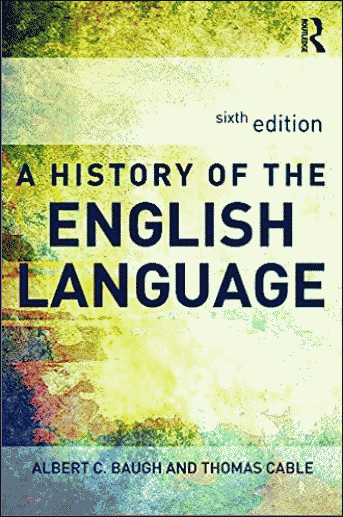
目下,第3章をおおよそ読了するところまで来ています.第3章の最後を飾るのが第52節 "Old English Literature" (pp. 65--68) です.古英語文学に関する重要な3ページ超の節で,短時間で超精読するにはなかなか手強い節です.これを私1人で解説するには荷が重いということで,本日6月12日(水)の夕方5時半頃より,強力な助っ人をお招きして,60分弱の対談精読実況生中継として2人でお届けする予定です(それでも終わらなければ,プレミアム限定配信 helwa で引き続き生配信することも十分にあり得ます).聴取はこちらからどうぞ.
今回は公開配信ということで,テキストも以下に掲載し公開しておきます(が,シリーズ継続のために,ぜひ本書を入手していただければ). *
52. Old English Literature. The language of a past time is know by the quality of its literature. Charters and records yield their secrets the philologist and contribute their quota of words and inflections to our dictionaries and grammars. But it is in literature that a language displays its full power, its ability to convey in vivid and memorable form the thoughts and emotions of a people. The literature of the Anglo-Saxons is fortunately one of the richest and most significant of any preserved among the early Germanic peoples. Because it is the language mobilized, the language in action, we must say a word about it.
Generally speaking, this literature is of two sorts. Some of it was undoubtedly brought to England by the Germanic conquerors from their continental homes and preserved for a time in oral tradition. All of it owes its preservation, however, and not a little its inspiration to the reintroduction of Christianity into the southern part of the island at the end of the sixth century, an event whose significance for the English language will be discussed in the next chapter. Two streams thus mingle in Old English literature, the pagan and the Christian, and they are never quite distinct. The poetry of pagan origin is constantly overlaid with Christian sentiment, while even those poems that treat of purely Christian themes contain every now and again traces of an earlier philosophy not wholly forgotten. We can indicate only in the briefest way the scope and content of this literature, and we shall begin with that which embodies the native traditions of the people.
The greatest single work of Old English literature is Beowulf. It is a poem of some 3,000 lines belonging to the type known as the folk epic, that is to say, a poem which, whatever it may owe to the individual poet who gave it final form, embodies material long current among the people. It is a narrative of heroic adventure relating how a young warrior, Beowulf, fought the monster Grendel, which was ravaging the land of King Hrothgar, slew it and its mother, and years later met his death while ridding his own country of an equally destructive foe, a fire-breathing dragon. The theme seems somewhat fanciful to a modern reader, but the character of the hero, the social conditions pictured, and the portrayal of the motives and ideals that animated people in early Germanic times make the poem one of the most vivid records we have of life in the heroic age. It is not an easy life. It is a life that calls for physical endurance, unflinching courage, and a fine sense of duty, loyalty, and honor. A stirring expression of the heroic ideal is in the words that Beowulf addresses to Hrothgar before going to his dangerous encounter with Grendel's mother: "Sorrow not... . Better is it for every man that he avenge his friend than that he mourn greatly. Each of us must abide the end of this world's life; let him who may, work mighty deeds ere he die, for afterwards, when he lies lifeless, that is best for the warrior."
Outside of Beowulf, Old English poetry of the native tradition is represented by a number of shorter pieces. Anglo-Saxon poets sang of the things that entered most deeply into their experience---of war and of exile, of the sea with its hardships and its fascination, of ruined cities, and of minstrel life. One of the earliest products of Germanic tradition is a short poem called Widsith in which a scop or minstrel pretends to give an account of his wanderings and of the many famous kings and princes before whom he has exercised his craft. Deor, another poem about a minstrel, is the lament of a scop who for years has been in the service of his lord and now finds himself thrust out by a younger man. But he is no whiner. Life is like that. Age will be displaced by youth. He has his day. Peace, my heart! Deor is one of the most human of Old English poems. The Wanderer is a tragedy in the medieval sense, the story of a man who once enjoyed a high place and has fallen upon evil times. His lord is dead and he has become a wanderer in strange courts, without friends. Where are the snows of yesteryear? The Seafarer is a monologue in which the speaker alternately describes the perils and hardships of the sea and the eager desire to dare again its dangers. In The Ruin, the poet reflects on a ruined city, once prosperous and imposing with its towers and halls, its stone courts and baths, now but the tragic shadow of what it once was. Two great war poems, the Battle of Brunanburh and the Battle of Maldon, celebrate with patriotic fervor stirring encounters of the English, equally heroic in victory and defeat. In its shorter poems, no less than in Beowulf, Old English literature reveals at wide intervals of time the outlook and temper of the Germanic mind.
More than half of Anglo-Saxon poetry is concerned with Christian subjects. Translations and paraphrases of books of the Old and New Testament, legends of saints, and devotional and didactic pieces constitute the bulk of this verse. The most important of this poetry had its origin in Northumbria and Mercia in the seventh and eighth centuries. The earliest English poet whose name we know was Cædmon, a lay brother in the monastery at Whitby. The story of how the gift of song came to him in a dream and how he subsequently turned various parts of the Scriptures into beautiful English verse comes to us in the pages of Bede. Although we do not have his poems on Genesis, Exodus, Daniel, and the like, the poems on these subjects that we do have were most likely inspired by his example. About 800, and Anglian poet named Cynewulf wrote at least four poems on religious subjects, into which he ingeniously wove his name by means of runes. Two of these, Juliana and Elene, tell well-known legends of saints. A third, Christ, deals with Advent, the Ascension, and the Last Judgment. The fourth, The Fates of the Apostles, touches briefly on where and how the various apostles died. There are other religious poems besides those mentioned, such as the Andreas, two poems on the life of St. Guthlac, a portion of a fine poem on the story of Judith in the Apocrypha; The Phoenix, in which the bird is taken as a symbol of the Christian life; and Christ and Satan, which treats the expulsion of Satan from Paradise together with the Harrowing of Hell and Satan's tempting of Christ. All of these poems have their counterparts in other literatures of the Middle Ages. They show England in its cultural contact with Rome and being drawn into the general current of ideas on the continent, no longer simply Germanic, but cosmopolitan.
In the development of literature, prose generally comes late. Verse is more effective for oral delivery and more easily retained in the memory. It is therefore a rather remarkable fact, and one well worthy of note, that English possessed a considerable body of prose literature in the ninth century, at a time when most other modern languages in Europe had scarcely developed a literature in verse. This unusual accomplishment was due to the inspiration of one man, the Anglo-Saxon king who is justly called Alfred the Great (871--99). Alfred's greatness rests not only on his capacity as a military leader and statesman but also on his realization that greatness in a nation is no simply physical thing. When he came to the throne he found that the learning which in the eight century, in the days of Bede and Alcuin, had placed England in the forefront of Europe, had greatly decayed. In an effort to restore England to something like its former state, he undertook to provide for his people certain books in English, books that he deemed most essential to their welfare. With this object in view, he undertook in mature life to learn Latin and either translated these books himself or caused others to translate them for him. First as a guide for the clergy he translated the Pastoral Care of Pope Gregory, and then, in order that the people might know something of their own past, inspired and may well have arranged for a translation of Bede's Ecclesiastical History of the English People. A history of the rest of the world also seemed desirable and was not so easily to be had. But in the fifth century when so many calamities were befalling the Roman Empire and those misfortunes were being attributed to the abandonment of the pagan deities in favor of Christianity, a Spanish priest named Orosius had undertaken to refute this idea. His method was to trace the rise of other empires to positions of great power and their subsequent collapse, a collapse in which obviously Christianity had had no part. The result was a book which, when its polemical aim had ceased to have any significance, was still widely read as a compendium of historical knowledge. This Alfred translated with omissions and some additions of his own. A fourth book that he turned into English was The Consolation of Philosophy b Boethius, one of the most famous books of the Middle Ages. Alfred also caused a record to be compiled of the important events of English history, past and present, and this, as continued for more than two centuries after his death, is the well-known Anglo-Saxon Chronicle. King Alfred was the founder of English prose, but there were others who carried on the tradition. Among these is Ælfric, the author of two books of homilies and numerous other works, and Wulfstan, whose Sermon to the English is an impassioned plea for moral and political reform.
So large and varied a body of literature, in verse and prose, gives ample testimony to the universal competence, at times to the power of beauty, of the Old English language.
終わり方も実に味わい深いですね.さて,次回からは第4章 "Foreign Influences on Old English" へと進みます.
(以下,後記:2024/06/16(Sun)
上記の生放送は2時間かけて配信されました.アーカイヴでは2回に分けてお届けしました(2回目はプレミアム限定配信となります).
(1) 「英語史の古典的名著 Baugh and Cable を読む (52) Old English Literature --- 和田忍さんとの実況中継(前半)」
(2) 「【英語史の輪 #146】 英語史の古典的名著 Baugh and Cable を読む (52) Old English Literature --- 和田忍さんとの実況中継(後半)」
・ Baugh, Albert C. and Thomas Cable. A History of the English Language. 6th ed. London: Routledge, 2013.
2024-06-11 Tue
■ #5524. 「名前プロジェクト」のメンバー4名の発表ダイジェスト in heldio [onomastics][name_project][voicy][heldio][ogawashun][yadomisan][goshosan]
昨年の夏に立ち上げた「名前プロジェクト」 (name_project) の4名のメンバーが,9ヶ月ほどかけて「名前と英語史」に関する研究を各々進めてきました.その成果は学会シンポジウムにおける口頭発表という形で結実しましたが,それだけで終わらせるのはもったいないということで,Voicy heldio にて,それぞれのダイジェスト版を収録し,アーカイヴとして配信しました.
・ 「#1075. 「後期古英語期におけるヴァイキングの名称 --- 社会に呼応する名前とその役割」 --- 小河舜さんのシンポ発表ダイジェスト」 by 小河舜さん(上智大学)
・ 「#1089. 「中英語の職業名 --- 英語名前史学の観点から」 --- 堀田隆一のシンポ発表ダイジェスト」 by 堀田隆一(慶應義塾大学)
・ 「#1102. 「初期近代英語におけるイエス・キリストの呼称 X に関する社会言語学的考察」 --- 矢冨弘さんのシンポ発表ダイジェスト」 by 矢冨弘さん(熊本学園大学)
・ 「#1105. 「現代英語の商標にみる名前の価値とふるまい」 --- 五所万実さんのシンポ発表ダイジェスト」 by 五所万実さん(目白大学)
あくまでダイジェストですので特にハンドアウトなどの資料も添付していませんし,短時間の収録かつ声で伝えられることのみをお話ししています.むしろ発表の概要としては分かりやすくなっているかもしれません.
各配信回につきまして,Voicy のコメント欄を通じてご意見やご質問などいただけますと,ご本人からの回答があるかもしれません! ぜひお寄せいただければ幸いです.
2024-06-09 Sun
■ #5522. 私の『英語語源辞典』推し活履歴 --- 2024年6月9日版 [link][etymology][review][voicy][heldio][helwa][lexicography][kdee][notice][khelf][hellog][asacul][notice]
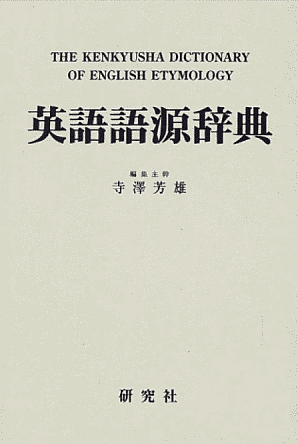
寺澤芳雄(編集主幹)『英語語源辞典』(研究社,1997年)の推し活を始めて11ヶ月ほどが経ちました.KDEE (= The Kenkyusha Dictionary of English Etymology) と略称される本辞典は日本の英語史研究の宝といってよい頼もしい存在です.本ブログでも kdee のタグのついた記事にて様々に取り上げてきました.
KDEE 推しにとって,とても嬉しいお知らせがあります.来たる6月19日に新装版が刊行されることになっているのです.研究社のサイトよりこちらのページをご覧ください.本体価格10,000円(+税)で現行版よりも値上がりしていますが,諸般の事情によるものと漏れ聞いています.それでも,この辞典がさらに普及していくために,今回の新装版刊行はおおいに歓迎すべき出来事だと思います.まだお持ちでない方は,ぜひ現行版あるいは新装版で入手され,英語史や英語語彙の学びに最大限に活用していただければ.
さて,前回の私の『英語語源辞典』推し活報告は,3ヶ月ほど前のことでした(cf. 「#5436. 私の『英語語源辞典』推し活履歴 --- 2024年3月15日版」 ([2024-03-15-1])).この3ヶ月の間にも推し活を続けてきましたので,前回の続きとして時系列で報告したいと思います.
・ 2024年3月15日 helwa のオンラインオフ会にて「『英語語源辞典』を漫然と読む/飲む」企画の第2回が開催される.
・ 2024年4月27日 朝日カルチャーセンター新宿教室にてシリーズ講座「語源辞典でたどる英語史」の開講がスタートする.1年かけて全12回の講座を毎月指定土曜日に開催予定.初回は「英語語源辞典を楽しむ」.本シリーズ講座では KDEE 以外の英語語源辞典も参照するがメインは KDEE.なお,2018年にも『英語語源辞典』に注目しつつ朝カルで英語語源講座を開いたことがある(cf. 「#3381. 講座「歴史から学ぶ英単語の語源」」 ([2018-07-30-1])).
・ 2024年5月14日 heldio/helwa リスナーの lacolaco さんによる note 上の「英語語源辞典通読ノート」にて,A の項目が踏破された旨が報告される.偉業.
・ 2024年5月18日 朝カルのシリーズ講座「語源辞典でたどる英語史」の第2回「英語語彙の歴史を概観する」が開講される.
・ 2024年6月6日 heldio にて「#1101. 『英語語源辞典』凡例読みシリーズ with 藤原郁弥さん&青木輝さん」が配信される.
・ 2024年6月8日 朝カルのシリーズ講座「語源辞典でたどる英語史」の第3回「英単語と「グリムの法則」」が開講される.
皆さんも,どのような形であれ,ぜひ KDEE 推し活にご参加いただければ!
・ 寺澤 芳雄(編集主幹) 『英語語源辞典』 研究社,1997年.
Powered by WinChalow1.0rc4 based on chalow